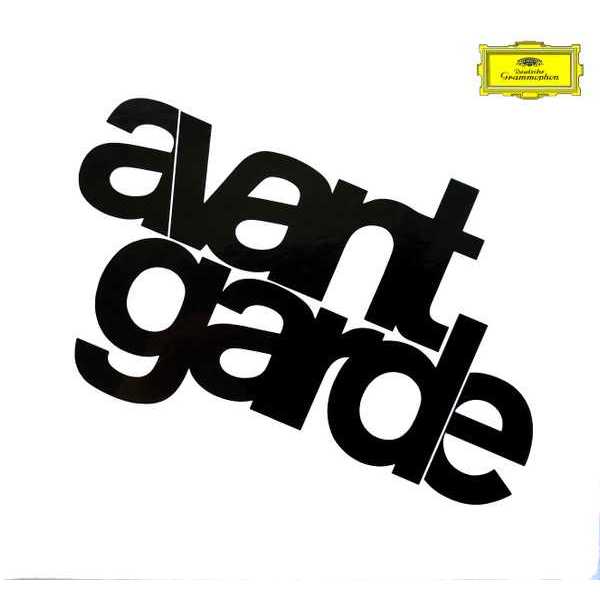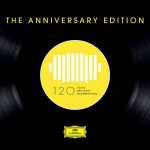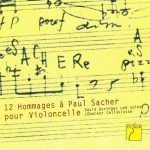
Number of Discs: 21
Format: FLAC (tracks+cue)
Label: Deutsche Grammophon
Catalogue: 00289 483 5677
Release: 2023
Size: 4.3 GB
Recovery: +3%
Scan: cover
CD 01
Witold Lutosławski: String Quartet
Krzysztof Penderecki: Quartetto per archi
Toshiro Mayuzumi: Prelude for String Quartet
CD 02
Mauricio Kagel: Phantasie für Orgel mit Obbligati
Juan Allende-Blin: Sonorités
György Ligeti: Volumina
György Ligeti: Etüde Nr. 1 (»Harmonies«)
CD 03
David Bedford: 2 Poems for Chorus on Words by Kenneth Patchen
György Ligeti: Lux aeterna
Arne Mellnäs: Succsim
Marek Kopelent: Matka
CD 04
Vinko Globokar: 1-5 Discours II
Luciano Berio: Sequenza V
Karlheinz Stockhausen: Solo für Melodie-Instrument mit Rückkopplung
Carlos Roqué Alsina: Consecuenza op. 17
CD 05
Mauricio Kagel: Match für 3 Spieler
Mauricio Kagel: Musik für Renaissance-Instrumente
CD 06
Karl Faust: Improvisationen: »… e poi?«
Karl Faust: Quasiraga
Karl Faust: Light Music
Karl Faust: Ancora un trio
Karl Faust: Credo
CD 07
Bernd Alois Zimmermann: Présence
Bernd Alois Zimmermann: Intercomunicazione
CD 08
John Cage: Atlas Eclipticalis & Winter Music. electronically amplified after Cartridge Music
Dieter Schnebel: Glossolalie
CD 09
Mauricio Kagel: Hallelujah
Dieter Schnebel: für stimmen (… missa est)
CD 10
Gottfried Michael Koenig: Terminus II
Gottfried Michael Koenig: Funktion Grün
Zoltán Pongrácz: Phonothese
Rainer Riehn: Chants de Maldoror
CD 11
Mauricio Kagel: Der Schall
CD 12
György Ligeti: String Quartet No. 2
Earle Brown: String Quartet
Wolf Rosenberg: String Quartet No. 3
CD 13
Luc Ferrari: Presque rien No 1
Luc Ferrari: Société II
CD 14
Lukas Foss: Paradigm (“for my friends”)
Lejaren Hiller: Algorithms I, Version I
Lejaren Hiller: Algorithms I, Version IV
Elliott Schwartz: Signals
CD 15
Roland Kayn: Cybernetics III
Luigi Nono: Contrappunto dialettico alla mente
CD 16
Franco Evangelisti: Die Schachtel
Heinz Holliger: Der magische Tänzer
CD 17
Cornelius Cardew: The Great Learning
CD 18
Roman Haubenstock-Ramati: Symphonie “K”
Vinko Globokar: Étude pour Folklora II
CD 19
Heinz Holliger: Siebengesang
Karlheinz Stockhausen: Spiral
CD 20
Sylvano Bussotti: Cinque frammenti all’Italia
Nicolaus Anton Huber: Versuch über Sprache
CD 21
Leo Küpper: L’enclume des forces
Leo Küpper: Électro-poème
Leo Küpper: Automatismes sonores
deutsche-grammophon-avantgarde-02.rar – 221.6 MB
deutsche-grammophon-avantgarde-03.rar – 162.5 MB
deutsche-grammophon-avantgarde-04.rar – 220.2 MB
deutsche-grammophon-avantgarde-05.rar – 217.1 MB
deutsche-grammophon-avantgarde-06.rar – 215.9 MB
deutsche-grammophon-avantgarde-07.rar – 190.8 MB
deutsche-grammophon-avantgarde-08.rar – 281.6 MB
deutsche-grammophon-avantgarde-09.rar – 293.7 MB
deutsche-grammophon-avantgarde-10.rar – 269.9 MB
deutsche-grammophon-avantgarde-11.rar – 181.0 MB
deutsche-grammophon-avantgarde-12.rar – 172.4 MB
deutsche-grammophon-avantgarde-13.rar – 246.6 MB
deutsche-grammophon-avantgarde-14.rar – 209.1 MB
deutsche-grammophon-avantgarde-15.rar – 210.2 MB
deutsche-grammophon-avantgarde-16.rar – 289.0 MB
deutsche-grammophon-avantgarde-17.rar – 225.6 MB
deutsche-grammophon-avantgarde-18.rar – 177.6 MB
deutsche-grammophon-avantgarde-19.rar – 165.3 MB
deutsche-grammophon-avantgarde-20.rar – 185.1 MB
deutsche-grammophon-avantgarde-21.rar – 229.7 MB
The legendary DG Avantgarde vinyl series (1968-1971) is turning 55! In order to celebrate this occasion, the series is now released on 21 CDs for the first time. The Avantgarde series serves as a historical document for a time of radical change in musical thinking and the breaking of artistic boundaries. The question “What is music?” confronted many of the composers and musicians involved in the series, and the anti-authoritarian spirit of the 1960s and 1970s was a palpable influence. Deutsche Grammophon’s Avantgarde Series reflects all the currents that thus arose, without aesthetic demarcations and across genres and instrumentations: large orchestral works stand alongside chamber music and solo forms, electronic music and improvisations.
The edition is presented in its original colourful designs by renowned graphic designer Holger Matthies, accompanied by a 186-page booklet with original commentaries (available in English & German) by composers and experts as well as photos of the artists from the DG archive.
Highlights include canon works by György Ligeti such as his choral work “Lux aeterna,” Luciano Berio’s “Sequenza V” with Vinko Globokar on trombone, a simultaneous recording of three works by John Cage, and some groundbreaking and monumental electronic works such as Luigi Nono’s “Contrappunto dialettico alla mente” and Leo Küpper’s “Automatismes sonores.”
It was in the signal year of 1968 that Deutsche Grammophon embarked on this extraordinary and ambitious project to sound out new music annually and offer the results in boxes of six LPs. To understand the impact and significance of this undertaking, one must go back to a time when very little music of this kind, written within the Western classical tradition but expanding the boundaries of that tradition, was available on record. Among many other things, the first avant-garde volume offered the first opportunity to hear and rehear key works by master ironist Mauricio Kagel or to explore the work of a leading composer-instrumentalist, Vinko Globokar. By organizing the content by instrumentation – a string quartet collection, an orchestral album, others are devoted to choral and organ music – the set cleverly avoids committing to aesthetic categories or alliances, leaving listeners to make their own connections. And Holger Matthies’ smart design made the thing an object of desire.
For people born in the few years after World War II, these records, sold separately to fit student budgets, filled a need. They wanted the world to change, and this was the music that changed them along with that of the Beatles, the Stones or Dylans. When the second avant-garde box included a side of John Cage, the whole enterprise began to take a certain Cageian direction, perhaps due to the influence of the theorist Heinz-Klaus Metzger, who had been involved from the beginning as the writer of the cover notes. The same orientation towards open scores and a questioning attitude towards authority was also exemplified by a whole measure of works by Dieter Schnebel (who had also written a blurb for the first volume) and an entire album, first in the series, dedicated to the work of the pioneering Rome-based improvisation group Nuova Consonanza, led by former composer Franco Evangelisti and whose members include Ennio Morricone. Electronic music also played an important role, both in the Cage recording and in an album of studio compositions by Gottfried Michael Koenig and his students. The recording of music by Bernd Alois Zimmermann – a postmodernist before the term was invented – suggested an alternative understanding of “avant-garde.”
The third volume is more international in scope, including a complete disc of American music and another that introduces a French composer for the first time, and also turns to the computer with the works of Lejaren Hiller and Roland Kayn. At the same time, this third series repeats the pattern of its predecessors by introducing Kagel, and the LaSalle Quartet returns with the premiere recording of Ligeti’s second quartet. The choice of Luc Ferrari among the French composers suggests a continued commitment to the experimental post-Cage wave.
In many ways, the fourth avant-garde episode was the most curious. The continued preoccupation with the experimental, the anti-authoritarian, would explain the inclusion of Evangelisti’s last composition-which is several years old and therefore practically an antique by the standards of this series-and the choice of Cornelius Cardew as the first British composer to be featured at length. Perhaps it was this aspect in the planning that brought the work of Belgian electronic composer Leo Kupper into the series. From another direction, there was a happy return for Globokar, and the music of another great composer and instrumentalist, Heinz Holliger, was made available on record for the first time. The fourth volume, released only as a set, was to be the last. With its end, the project remained true to history. by 1971 there was no longer the one avant-garde, but a multitude of composers emerging from every conceivable drawer.



